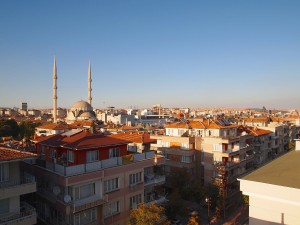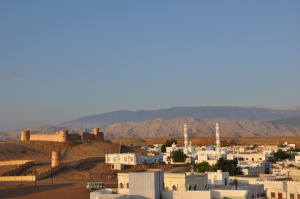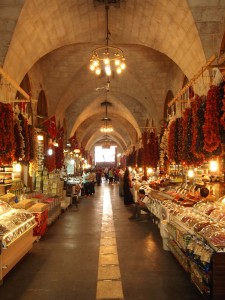Michael Adams, who worked at Albert College and in the LINC program at Loyola School of Adult and Continuing Education in Belleville, writes about his short but overwhelmingly positive sojourn as an ESL teacher in Gaziantep, Turkey.

Turkey has always been a country romanticized for its beautiful historical sites, its cuisine and for having a culture with one foot in the West and another in the East. For me, as a teacher about to embark on a year-long journey in the south-eastern city of Gaziantep, I felt as if I was in the midst of a grand adventure. Although I had previously spent two years working in the Middle East in a small fishing/Bedouin community in rural Oman, I had a strong desire to return to the region and explore an area that I had not yet had the opportunity to visit. Like others, I was captivated by Turkey and elated that I was offered a position to teach English and TOEFL. Prior to departure, I had long conversations with my fiancée, Sarah, my family, and my friends about my exciting plans for the year. However, even though I was optimistic that my time in Gaziantep would be overwhelmingly positive, there were issues relating to security that already worried others and myself.
After the events that led to the Syrian uprising in 2011, the City of Gaziantep quickly gained notoriety as the smuggling point for Jihadist fighters, thus being labelled “The Jihadist Highwayâ€. Its proximity to the Syrian border (approximately 60 km) made it a heavily used conduit for refugees, spies, insurgent fighters, foreign-aid workers, and covert jihadists—all active participants in the war in Syria. Whether it was to fight for the Free Syrian Army or the nefarious Islamic State, people, arms and supplies freely moved into and out of Syria through Gaziantep. As a teacher with ten years of experience teaching ESL overseas, I tried my best to reassure my fiancée and family that I would be safe and promised to keep an eye on the situation. Confident that I was far enough away from the conflict, I boarded my plane in Toronto and felt optimistic that I was destined for a year of adventure.

My first impressions of the city met the high expectations that I held for Gaziantep. The city was dotted with stunning ancient mosques, exquisite traditional markets, along with some of the friendliest people I have ever met. As I settled down and began my routine of teaching, exploring and having dinner on the rooftop of my apartment each night, I quickly fell in love with living in such a unique part of the world. The reservations I had about living in “The Jihadist Highway†dissipated as I started to settle into my new home.
It is remarkable how quickly events can change. My first exposure to the reality of living in “The Jihadist Highway†was the arrest of 19 fighters from the Islamic State of Iraq and Syria(ISIS) who had set up a training camp for new recruits in Gaziantep. Despite this, I continued to feel optimistic and believed that it was an isolated occurrence. It was when the police discovered 150 kilograms of explosives along with several caches of suicide vests that it started to sink in that there was a real potential for violence. This was confirmed with the regular violent clashes between the Kurdish population and ISIS over the events in the town of Kobane, Syria. There were also constant threats of kidnapping of foreigners and threats of running into jihadist fighters around the city. I began to look at my new home through different eyes. However, all these things were not catalysts for my departure. For me, I had normalized them all as just another part of living in Gaziantep and pushed them aside while I continued my routine of work, exploring, and dinner on the rooftop.

My decision to leave Gaziantep was not based on how I personally felt about living in the city, but rather on an aspect of living abroad that I admittedly neglected – my friends, family, and fiancée. I was inundated with e-mails from family and friends who expressed their deepest concerns for my welfare. Many questioned my decision to continue living in Turkey. Over time, I began to realize that my presence in Gaziantep was having a profoundly negative effect on the people in my life that I am closest to. With much deliberation, I made the decision to talk to my school and give notice that I would be leaving Turkey. Fortunately, there were several local teachers who were looking for work at my school and the administration was extremely supportive about my situation.
As I write this article from Ireland, where I’m living with my fiancée as she finishes medical school and I complete my Master’s of Education, I wish to end my reflection on a positive note. Turkey is a magical country that evokes strong emotions of adventure. The people are exceptional, and would bend over backwards to accommodate any foreigner looking for assistance. The country was everything I expected it to be and more.
For newly certified teachers looking to embark on their own journey in a world outside of Canada, I can say with great enthusiasm that you will never regret it. Each step you take outside of your comfort zone is one closer to understanding the world we live in. Although there is controversy as to whether this is a genuine quotation of Mark Twain, I firmly believe that it best encapsulates the wonders of living and working abroad:
“Twenty years from now you will be more disappointed by the things you didn’t do than by the ones you did do. So throw off the bowlines. Sail away from the safe harbor. Catch the trade winds in your sails. Explore. Dream. Discover.†— Mark Twain
Michael Adams has a Bachelor of Arts in History and a Post-Graduate Diploma in Education—the UK equivalent of a Canadian B.Ed. He has a TEFL Certificate and is currently finishing his Masters of Education (TESOL). His research has focused on improving educational outcomes for immigrants and refugees who are new to the Canadian education system. Over the past 10 years, he has taught in nine countries, including Japan, Korea, Thailand, Taiwan, Oman, Scotland, Turkey, Ireland and Canada. He is an avid outdoor enthusiast and spends his free time mountain and rock climbing, canoeing, trekking and mountain biking.